George Randell (5 October 1830 – 2 June 1915) was an Australian businessman and politician. He served intermittently in the Parliament of Western Australia between 1875 and 1910, including as a minister in the government of Sir John Forrest.
Contents
- Biography
- Entry into politics
- The state aid issue and Opposition leadership
- Later political life
- References
Born in England, Randell arrived in Western Australia in 1850, and subsequently gained prominence in Perth as a businessman. He was elected to the Perth City Council in 1870, and then to the colony's Legislative Council in 1875, where he served until 1878. He returned to the Legislative Council in 1880, as an appointee of the governor. In 1890, Randell won election to the seat of Moore in the newly created Legislative Assembly. He resigned in 1892 and was re-appointed to the Legislative Council the following year, but re-entered the Legislative Assembly at the 1894 election, winning the seat of Perth. For a time, Randell led the opposition against the Forrest government, although he eventually joined Forrest's ministry, serving as Colonial Secretary and Minister for Education from 1898 to 1901. He had left the Legislative Assembly again in 1897 to return to the Legislative Council, where he remained until his retirement in 1910.
Biography
Randell was born in Milton (now New Milton), Hampshire, England, to James Randell, a cordwainer and trader, and Jane Randell. He was educated in Milton, learning blacksmithing and engineering, and by 1850 was a blacksmith in the village. He married Jane Hyde on 8 April 1850, and 19 days later, they sailed to Western Australia aboard the Sophia, arriving on 27 July 1850. [1] Initially working as a carpenter, engineer and produce merchant, Randell founded the Perth to Fremantle paddle steamer service in 1860. From his arrival in Western Australia, he also became a mainstay of the Congregational church in Western Australia, holding every lay office over his more than sixty years of involvement. [2] On 17 March 1868, his wife Jane, with whom he had fathered six sons (one of whom had died in infancy in 1861), died of concussion. He married Mary Louise Smith at Trinity Church, Perth, on 14 October 1869. They had two daughters and a son, Ernest Randell (who later became a noted cricketer), before Mary died on 24 August 1874. On 26 January 1881, Randell married Lucy James (née Francisco), the widow of Edward James who had died the previous year—Randell thus became the stepfather to Walter James, a future premier under responsible government in 1902–1904. In 1887, he resumed his old steamer business, but sold it in 1894 to the Swan River Shipping Company. [3]
Entry into politics
Randell became a significant political figure in Western Australia, serving in various capacities for almost 40 years. During this time he earned a reputation as a supporter of economic liberalism, separation of church and state and secular education, among other causes. He was known for his attention to detail and his cautious and conciliatory nature, and served on many select committees and Royal Commissions. [2]
His first involvement with politics was the Perth Municipal Council, where he became a councillor in 1870 and chairman for a term in 1874–75. He subsequently won a by-election for the Legislative Council's seat of Perth on 25 January 1875. In 1876, he campaigned successfully for the establishment of a state high school in Perth, but failed to prevent the construction of the Perth-Fremantle railway which created competition for his paddle steamer service. He sold the service, resigned his seat on the Legislative Council on 1 May 1878, and returned to England. [2]
He returned to Perth two years later, and on 5 July 1880 was appointed to a nominative seat on the Legislative Council by the Governor, and also became a member of the Central Board of Education. Despite leading the opposition to the introduction of responsible government in 1887, [4] Randell resigned his seat on 21 October 1890 to contest the seat of Moore in the new Legislative Assembly, which he won unopposed. [5] He served as Chairman of Committees in the Legislative Assembly from 20 January 1891 until 4 July 1892, when he resigned his seat. During this time, he also unsuccessfully contested the mayoralty in Perth. On 17 July 1893, he was once again appointed to a nominative Legislative Council seat, which he held until nominative seats were abolished ahead of the 1894 elections. [3]
The state aid issue and Opposition leadership
With the economy benefiting from the gold rush in the Coolgardie-Goldfields region, public attention turned to education. In 1892, the John Forrest government had overseen the creation of a Department of Education under ministerial control, while maintaining state aid to private schools—a concession to the Catholic Church, who had set up schools to provide education to their own generally working-class children. Randell was not happy with the compromise, and set up a National Education League to oppose state aid, arguing that supporting both systems with government funds was an obstacle to the creation of an efficient education system in Western Australia. In this he was supported by other abolitionists such as his stepson Walter James, by now a prominent lawyer, and former Fremantle mayor Barrington Wood, and opposed by Catholic MLAs Thomas Molloy, Timothy Quinlan and Alfred Canning. However, Randell and his supporters won at the June 1894 elections against all three, and the previously disorganised opposition to Premier Forrest rallied around him. He became Leader of the Opposition at the first parliamentary sitting on 31 July 1894. [6] [7]
The choice of Randell as opposition leader reflected the opposition's priorities as much as it did his own qualities—he was a conservative businessman thoroughly identified with the existing social and economic order, and welcomed by Forrest himself who believed Randell would "deal with all matters in a moderate way". [8] In September, however, the Forrest government attempted to raise the grant to private schools. [9] This failed when the Chairman of Committees, William Traylen, used his casting vote to break the tie and the status quo was maintained, but the secularists then moved their own motion in October calling for an end to the grant. Randell himself described state aid in the debate as "an indignity cast upon religion, and upon those who believe in religion, to have to come as paupers to this House for a grand of money for the upkeep of that with which the State has nothing whatever to do." The motion was carried, but nothing further was done until the following year. [6] [10]
At this time, considerable changes were going on within the opposition group. Members such as George Leake and Frederick Illingworth had moved away from Henry Lefroy's view that the opposition should not "thwart the Government, but rather unitedly assist" towards one of ultimately overthrowing the Forrest government. At the start of the next session in July 1895, Leake moved a motion of no confidence in the government's education policy. Randell believed the Government had taken the hint and would gradually move in the right direction. Forrest and his attorney-general, Septimus Burt, gave an undertaking in the debate that state aid would be terminated, and Leake dropped the motion. However, Randell was unhappy with the tactics used, and resigned the leadership to Leake, and ultimately joined the Forrest party along with other erstwhile opponents. [6] [9]
Later political life
Randell did not contest Perth at the 1897 elections, but on 28 May 1897 he won a Metropolitan Province seat in the Legislative Council at a by-election, which he was to hold for 13 years. From 28 April 1898 until 27 May 1901, he served as Colonial Secretary and Minister for Education in the Forrest government. During this time he initiated the Claremont Teachers College, the first in Western Australia, which opened in 1902 with Oxford graduate Cecil Andrews as principal. In 1901, the opposition to the Forrest government won office in the Legislative Assembly, and Randell's ministerial role ceased—however, he was appointed as chairman of the Perth Hospital Board, and later became a trustee under the 1904 Act which ultimately established the University of Western Australia in 1911. During this time, he also served as the Western Australian chairman of the Australian Mutual Provident Society, director of the Western Australian Bank and president of the Perth Working Men's Association.
On 27 May 1910, aged nearly 80 and thrice widowed after the death of his wife Lucy in 1897, he retired from public life, but continued his involvement with the Congregational church. He died in Havelock Street, West Perth, on 2 June 1915, and was buried in the Congregational section of Karrakatta Cemetery. [2] [3]
Related Research Articles
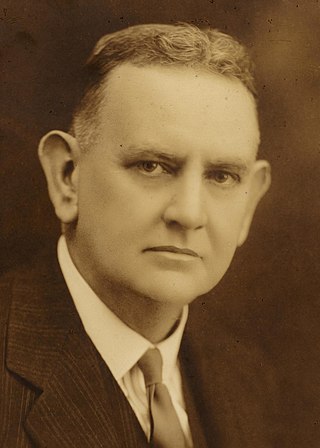
Sir Harry Pateshall Colebatch was a long-serving figure in Western Australian politics. He was a member of the Western Australian Legislative Council for nearly 20 years, the twelfth Premier of Western Australia for a month in 1919, agent-general in London for five years, and a senator for four years. He was known for supporting free trade, federalism and Western Australian secessionism, and for opposing communism, socialism and fascism. Born in England, his family migrated to South Australia when Colebatch was four years old. He left school aged 11 and worked for several newspapers in South Australia before moving to Broken Hill in New South Wales in 1888 to work as a reporter for the Silver Age. In 1894, he moved to the Western Australian Goldfields following the gold rush there, working for the Golden Age in Coolgardie and the Kalgoorlie Miner in Kalgoorlie. Two years later, he moved to Perth to join the Morning Herald, but after that newspaper collapsed, he moved to Northam where he started The Northam Advertiser. He also became friends with local bank manager James Mitchell and convinced Mitchell to run for state parliament. Colebatch was the mayor of Northam between 1909 and 1912.

George Leake was the third Premier of Western Australia, serving from May to November 1901 and then again from December 1901 to his death.

Sir Walter Hartwell James, was the fifth Premier of Western Australia and an ardent supporter of the federation movement.
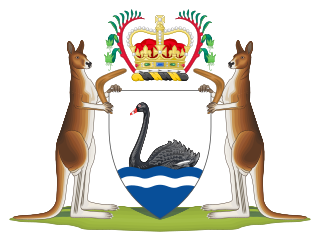
The Throssell Ministry was the second Ministry of the Government of Western Australia. It succeeded the Forrest Ministry on 15 February 1901 after Sir John Forrest's move from state to federal politics, and was led by Forrest's choice of successor, George Throssell. However, no clear winner emerged from the April 1901 state election, and rather than test his support in the Assembly, Throssell and the Ministry he led resigned on 27 May 1901, allowing the Leake Ministry led by Opposition Leader George Leake to take office.
The Morgans Ministry was the fourth ministry of the Government of Western Australia, led by Alf Morgans of the Ministerialist faction. It succeeded the First Leake Ministry on 21 November 1901, and was followed by the Second Leake Ministry on 23 December 1901.

Thomas George Anstruther Molloy was an Australian politician. He was a member of the Western Australian Legislative Assembly (MLA) for the electorate of Perth from 1892 until 1894, and thereafter became a perennial candidate, unsuccessfully standing for parliament 14 times. He also served two terms as the Mayor of Perth, from 1908 to 1909 and from 1911 to 1912. Molloy made a significant contribution to the cultural life of Perth, building numerous hotels and the first two theatres in the city, most notably His Majesty's Theatre, which is still open today.
Timothy Francis Quinlan was an Irish-born Australian politician who represented the electorates of West Perth and Toodyay in the Western Australian Legislative Assembly between 1890 and 1894, and 1897 and 1911, respectively. Quinlan was also Speaker of the Assembly for a period of time between 1905 and 1911.

Sir George Shenton was a prominent businessman in colonial Western Australia, the first Mayor of Perth, and a Member of the Western Australian Legislative Council for over thirty years.

The electoral district of Perth is a Legislative Assembly electorate in the state of Western Australia. Perth is named for the capital city of Western Australia whose central business district falls within its borders. It is one of the oldest electorates in Western Australia, with its first member having been elected in the inaugural 1890 elections of the Legislative Assembly.

Frederick Illingworth, was an Australian politician, who was a Member of Parliament in two Australian colonies, and a government minister in Western Australia. As a financer of land speculation in Victoria in the 1880s, he was heavily involved in the Victorian land boom.
This is a list of members of the Western Australian Legislative Assembly between the 1890 elections and the 1894 elections, known as the First Parliament. They held office under the Constitution Act 1889, which was given royal assent by Queen Victoria on 15 August 1890 and took effect on 21 October 1890 with a proclamation by the new Governor of Western Australia, Sir William Robinson.

Elections were held in the state of Western Australia on 3 October 1911 to elect 50 members to the Western Australian Legislative Assembly. The Labor Party, led by Opposition Leader John Scaddan, defeated the conservative Ministerialist government led by Premier Frank Wilson. In doing so, Scaddan achieved Labor's first absolute majority on the floor of the Assembly and, with 68% of the seats, set a record for Labor's biggest majority in Western Australia. The record would stand for nearly 106 years until Labor won 69% of seats at the 2017 election. The result came as something of a surprise to many commentators and particularly to the Ministerialists, as they went to an election for the first time as a single grouping backed by John Forrest's Western Australian Liberal League, under a new system of compulsory preferential voting and new electoral boundaries both of which had been passed by Parliament earlier in the year despite ardent Labor opposition.

Elections were held in the state of Western Australia between 27 April and 26 May 1897 to elect 44 members to the Western Australian Legislative Assembly. The Ministerialist group led by John Forrest won a third term in office as a result of the elections. The poll took place based on boundaries established in the Constitution Act Amendment Act 1896, which increased the number of members from 33 mainly by adding new seats in the Goldfields region, and had been called a year earlier than was necessary. In 18 of the 44 seats, only one candidate nominated and polls were not held.
This is a list of members of the Western Australian Legislative Assembly between the 1901 election and the 1904 election, together known as the Fourth Parliament.
Elections were held in the state of Western Australia on 24 April 1901 to elect 50 members to the Western Australian Legislative Assembly. It was the first election to take place since responsible government without the towering presence of Premier Sir John Forrest, who had left state politics two months earlier to enter the first Federal parliament representing the Division of Swan, and the first state parliamentary election to follow the enactment of women's suffrage in 1899.
The Electoral district of West Perth was a Legislative Assembly electorate in the state of Western Australia. The district was named for its location immediately to the west of the central business district of Perth.
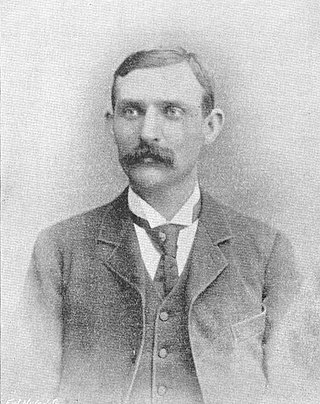
Joseph John Holmes was an Australian politician who served in both houses of the Parliament of Western Australia. A minister in both governments of George Leake, he was a member of the Legislative Assembly from 1897 to 1904 and again from 1905 to 1906, and later a member of the Legislative Council from 1914 until his death.

Barrington Clarke Wood was an Australian businessman and politician who served in both houses of the Parliament of Western Australia. A minister in the governments of Sir John Forrest and George Throssell, he was a member of the Legislative Assembly from 1894 to 1901, and then a member of the Legislative Council from 1902 until his death.

Elections were held in the Colony of Western Australia in December 1890 to elect 30 members to the Legislative Assembly. They were the first elections to be held for the Legislative Assembly, which had been created earlier in the year by a new constitution that granted Western Australia responsible self-government.
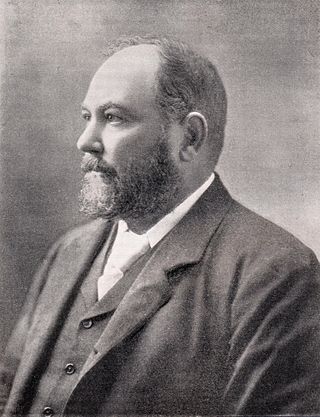
Elections were held in the Colony of Western Australia in June and July 1894 to elect 33 members to the Legislative Assembly. Less than half of the seats were contested and virtually all campaigns were fought on local issues, although a few candidates were endorsed by extraparliamentary organisations. The election presented no threat to the government of Sir John Forrest, but its aftermath saw the establishment of a credible opposition for the first time, led by George Randell.
References
- ↑ Perth Dead Persons' Society (9 April 2001). "Passenger Ships Arriving in Western Australia - Sophia" . Retrieved 26 January 2008.
- 1 2 3 4 Bolton, Geoffrey (1976). "Randell, George (1830-1915)". Australian Dictionary of Biography . Canberra: National Centre of Biography, Australian National University. ISBN 978-0-522-84459-7. ISSN 1833-7538. OCLC 70677943 . Retrieved 26 January 2008.
- 1 2 3 Black, David; Bolton, Geoffrey (2001). Biographical Register of Members of the Parliament of Western Australia, Volume One, 1870–1930 (Revised ed.). Parliament House: Parliament of Western Australia. ISBN 0730738140.
- ↑ Bolton, Geoffrey; Mozley, Ann (1961). The Western Australian Legislature, 1870-1930. Australian National University. p. 154.
- ↑ Black, David; Prescott, Valerie (1997). Election statistics, Legislative Assembly of Western Australia, 1890-1996. Perth: Parliamentary History Project and Western Australian Electoral Commission. p. 200. ISBN 0-7309-8409-5.
- 1 2 3 de Garis, Brian (1981). "Self-government and the evolution of party politics". In Stannage, C.T. (ed.). A New History of Western Australia. Nedlands: University of Western Australia Press. pp. 342–343. ISBN 0-85564-170-3.
- ↑ de Garis, Brian (1991). "Self-Government and Political Parties". In Black, David (ed.). The house on the hill: A history of the Parliament of Western Australia 1832-1990. West Perth: Parliament of Western Australia. pp. 72–73. ISBN 0-7309-3983-9.
- ↑ Parliamentary Debates (Hansard) . Western Australian Legislative Assembly. 31 July 1894. p. 72.
- 1 2 de Garis, in Black, p.75-76.
- ↑ Aveling, Marion (1981). "Western Australian Society - The Religious Aspect", in Stannage, C.T.: A New History of Western Australia. p.596-597.
George Randell | |
|---|---|
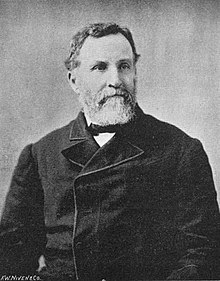 | |
| Member of the Legislative Council of Western Australia | |
| In office 25 January 1875 –1 May 1878 |